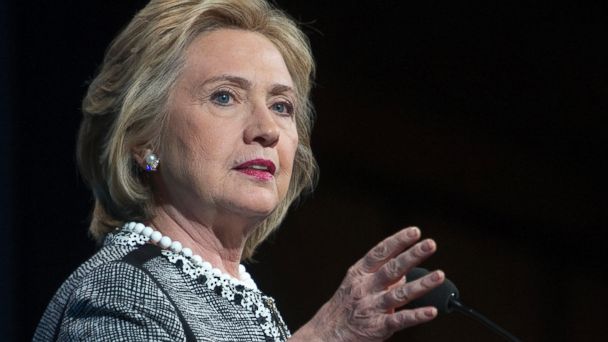Hillary Clinton Fights Back on 5 Criticisms About Benghazi
In a leaked the chapter of her new book "Hard Choices," obtained and first reported by Politico, former Secretary of State Hillary Clinton takes on critics of her role in the Benghazi Libya mission attack on September 11, 2012. The attack killed four Americans, including the ambassador to the country, Christopher Stevens.

(Cliff Owen/AP Photo)
The former Secretary of State has come under fire from Republicans for what lawmakers have called at worst a cover-up and at best a lack of leadership. According to Politico, in the chapter titled, "Benghazi: Under Attack," Clinton seems to address each criticism head on, chastising what she calls the politicization of a tragedy, while simultaneously launching a defense of her actions, should she choose to run for president in 2016.
Read More: White House Contacted YouTube During Benghazi Attack, Darrell Issa Says
Read More: 'Delusional Minority' Driving GOP on Benghazi, David Plouffe Says
Watch: 'This Week': Benghazi Firestorm
Hillary Clinton will sit down with ABC News Anchor Diane Sawyer for her first television interview in conjunction with the release of her new book, airing during a one-hour ABC News prime time special on Monday, June 9, at 9 p.m. ET.
ABC News' Robin Roberts will follow up with Clinton's first live interview, on Tuesday, June 10, on "Good Morning America."
Here are the top 5 criticisms - and her responses - based on excerpts in Politico's report.
1. Criticism: Clinton wants to sweep Benghazi under the rug rather than seek the truth, as evidenced by her comment during her Jan. 23, 2013, testimony before the Senate Foreign Relations Committee where she expressed exacerbation over senators questions about the Benghazi talking points, asking "what difference at this point does it make?"
Response: In the book, Clinton says her words have been twisted for political gain. She accuses the Republicans of being disingenuous by implying that she meant she didn't care about the tragedy.
"My point was simple: If someone breaks into your home and takes your family hostage, how much time are you going to spend focused on how the intruder spent his day as opposed to how best to rescue your loved ones and then prevent it from happening again?" she said.
2. Criticism: Clinton denied additional security requests for protection of the Benghazi consulate in cables sent from the embassy leading up to the attack.
Response: The former Secretary of State doubles down on her assertion that not only did she not see the cables, but that any addressed to her were "a procedural quirk." She reiterates her comments in her congressional testimony that every cable sent from the field does not cross her desk, nor she says, should it. "That's not how it works. It shouldn't. And it didn't," she writes.
3. Criticism: Clinton and the State Department had the talking points Ambassador Susan Rice presented to the public altered to minimize the terror references to protect herself and the administration
Response: Again Clinton stands by previous statements where she maintained that it was the non-political, intelligence community that drafted the talking points used by Rice. "Susan stated what the intelligence community believed, rightly or wrongly, at the time," Clinton writes. "That was the best she or anyone could do. Every step of the way, whenever something new was learned, it was quickly shared with Congress and the American people. There is a difference between getting something wrong, and committing wrong. A big difference that some have blurred to the point of casting those who made a mistake as intentionally deceitful."
And she repeats her point from her testimony about why it was Rice, and not her, who appeared on the morning political shows on Sunday, Sept. 16. She didn't appear, she writes, because she didn't want to.
"I don't see appearing on Sunday-morning television as any more of a responsibility than appearing on late-night TV," she said. "Only in Washington is the definition of talking to Americans confined to 9 A.M. on Sunday mornings."
4. Criticism: Clinton and the Obama administration pushed the narrative that wide-spread anger over an anti-Islam movie was the catalyst for the attack, which intelligence has since proven incorrect.
Response: During her testimony in January 2013 she maintained that while the administration had concluded there had been no protests before the attack, it was still not possible to know the motivation for all of the gunmen who attacked the consulate that night. In the chapter she reiterates that subsequent investigations, including by the New York Times, have found that anger over the video may have been one of the motivating factors for some of the attackers.
"There were scores of attackers that night, almost certainly with differing motives," she writes. "It is inaccurate to state that every single one of them was influenced by this hateful video. It is equally inaccurate to state that none of them were. Both assertions defy not only the evidence but logic as well."
5. Criticism: The findings from the Accountability Review Board were skewed and not independent because Clinton picked most of the members, and did not allow members to interview her.
Response: Clinton maintains that the four people she picked, out of the five member panel, were objective. She writes that the members "had unfettered access to anyone and anything they thought relevant to their investigation, including me if they had chosen to do so."